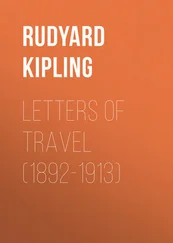Rudyard Kipling - From Sea to Sea; Letters of Travel
Здесь есть возможность читать онлайн «Rudyard Kipling - From Sea to Sea; Letters of Travel» — ознакомительный отрывок электронной книги совершенно бесплатно, а после прочтения отрывка купить полную версию. В некоторых случаях можно слушать аудио, скачать через торрент в формате fb2 и присутствует краткое содержание. Жанр: foreign_prose, foreign_language, на английском языке. Описание произведения, (предисловие) а так же отзывы посетителей доступны на портале библиотеки ЛибКат.
- Название:From Sea to Sea; Letters of Travel
- Автор:
- Жанр:
- Год:неизвестен
- ISBN:нет данных
- Рейтинг книги:5 / 5. Голосов: 1
-
Избранное:Добавить в избранное
- Отзывы:
-
Ваша оценка:
- 100
- 1
- 2
- 3
- 4
- 5
From Sea to Sea; Letters of Travel: краткое содержание, описание и аннотация
Предлагаем к чтению аннотацию, описание, краткое содержание или предисловие (зависит от того, что написал сам автор книги «From Sea to Sea; Letters of Travel»). Если вы не нашли необходимую информацию о книге — напишите в комментариях, мы постараемся отыскать её.
From Sea to Sea; Letters of Travel — читать онлайн ознакомительный отрывок
Ниже представлен текст книги, разбитый по страницам. Система сохранения места последней прочитанной страницы, позволяет с удобством читать онлайн бесплатно книгу «From Sea to Sea; Letters of Travel», без необходимости каждый раз заново искать на чём Вы остановились. Поставьте закладку, и сможете в любой момент перейти на страницу, на которой закончили чтение.
Интервал:
Закладка:
At last the faithful servitor, who had helped to fight the Battle of the Mail Bags at Udaipur, broke his silence, and vowing that all these devil-people – not more than twelve – had only come to see the fun, suggested the breaking of the munshi's head. And, indeed, that seemed the best way of breaking the ice; for the munshi had, in the politest possible language, put forward the suggestion that there was nothing particular to show that the Sahib who held the purwana had really any right to hold it. The chowkidar woke up and chanted a weird chant, accompanied by the Anglo-Saxon attitudes, a new set. He was an old man, and all the Sahib-log said so, and within the pavilion were tables and chairs and lamps and bath-tubs, and everything that the heart of man could desire. Even now an enormous staff of menials were arranging all these things for the comfort of the Sahib Bahadur and Protector of the Poor, who had brought the honour and glory of his Presence all the way from Deoli. What did tables and chairs and eggs and fowls and very bright lamps matter to the Raj? He was an old man and … "Who put the present Raja on the throne?" "Lake Sahib," promptly answered the chowkidar . "I was there. That is the news of many old years." Now Tod says it was he himself who installed "Lalji the beloved" in the year 1821. The Englishman began to lose faith in the chowkidar . The munshi said nothing but followed the Englishman with his one workable eye. A merry little breeze crisped the waters of the lake, and the fish began to frolic before going to bed.
"Is nobody going to do or bring anything?" said the Englishman, faintly, wondering whether the local gaol would give him a bed if he killed the munshi . "I am an old man," said the chowkidar , "and because of their great respect and reverence for the Sahib in whose Presence I am only a bearer of orders and a servant awaiting them, men, many men, are bringing now tent-flies which I with my own hands will wrap, here and there, there and here, in and about the pillars of the place; and thus you, O Sahib, who have brought the honour of your Presence to the Boondi Raj over the road to Deoli, which is a kutcha road, will be provided with a very fine and large apartment over which I will watch while you go to kill the tigers in these hills."
By this time two youths had twisted canvas round some of the pillars of the colonnade, making a sort of loose-box with a two-foot air-way all round the top. There was no door, but there were unlimited windows. Into this enclosure the chowkidar heaped furniture on which many generations of pigeons had evidently been carried off by cholera, until he was entreated to desist. "What," said he, scornfully, "are tables and chairs to this Raj? If six be not enough, let the Presence give an order, and twelve shall be forthcoming. Everything shall be forthcoming." Here he filled a native lamp with kerosene oil and set it in a box upon a stick. Luckily, the oil which he poured so lavishly from a quart bottle was bad, or he would have been altogether consumed.
Night had fallen long before this magnificence was ended. The superfluous furniture – chairs for the most part – was shovelled out into the darkness, and by the light of a flamboyant lamplet – a merry wind forbade candles – the Englishman went to bed, and was lulled to sleep by the rush of the water escaping from the overflow trap and the splash of the water-turtle as he missed the evasive fish. It was a curious sight. Cats and dogs rioted about the enclosure, and a wind from the lake bellied the canvas. The brushwood of the hills around snapped and cracked as beasts went through it, and creatures – not jackals – made dolorous noises. On the lake it seemed that hundreds of water-birds were keeping a hotel, and that there were arrivals and departures throughout the night. The Raj insisted upon providing a guard of two sepoys, very pleasant men, on four rupees a month. These said that tigers sometimes wandered about on the hills above the lake, but were most generally to be found five miles away. And the Englishman promptly dreamed that a one-eyed tiger came into his tent without a purwana . But it was only a wild cat after all; and it fled before the shoes of civilisation.
The Sukh Mahal was completely separated from the city, and might have been a country-house. It should be mentioned that Boondi is jammed into a V-shaped gorge – the valley at the main entrance being something less than five hundred yards across. As it splays out, the thickly packed houses follow its lines, and, seen from above, seem like cattle herded together preparatory to a stampede through the gate. Owing to the set of the hills, very little of the city is visible except from the Palace. It was in search of this latter that the Englishman went abroad and became so interested in the streets that he forgot all about it for a time. Jeypore is a show-city and is decently drained; Udaipur is blessed with a State Engineer and a printed form of Government; for Jodhpur the dry sand, the burning sun, and an energetic doctor have done a good deal, but Boondi has none of these things. The crampedness of the locality aggravates the evil, and it can only be in the rains which channel and furrow the rocky hillsides that Boondi is at all swept out. The Nal Sagar, a lovely little stretch of water, takes up the head of the valley called Banda Gorge, and must, in the nature of things, receive a good deal of unholy drainage. But setting aside this weakness, it is a fascinating place – this jumbled city of straight streets and cool gardens, where gigantic mangoes and peepuls intertwine over gurgling watercourses, and the cuckoo comes at midday. It boasts no foolish Municipality to decree when a house is dangerous and uninhabitable. The newer shops are built into, on to, over, and under time-blackened ruins of an older day, and the little children skip about tottering arcades and grass-grown walls, while their parents chatter below in the crowded bazaar. In the black slums, the same stones seem to be used over and over again for house-building. Wheeled conveyances are scarce in Boondi city – there is scant room for carts, and the streets are paved with knobsome stones, unpleasant to walk over. From time to time an inroad of Bunjaras' pack-bullocks sweeps the main streets clear of life, or one of the Raja's elephants – he has twelve of them – blocks the way. But, for the most part, the foot-passengers have all the city for their own.
They do not hurry themselves. They sit in the sun and think, or put on all the arms in the family, and, hung with ironmongery, parade before their admiring friends. Others, lean, dark men, with bound jaws and only a tulwar for weapon, dive in and out of the dark alleys, on errands of State. It is a beautifully lazy city, doing everything in the real, true, original native way, and it is kept in very good order by the Durbar. There either is or is not an order for everything. There is no order to sell fishing-hooks, or to supply an Englishman with milk, or to change for him currency notes. He must only deal with the Durbar for whatever he requires; and wherever he goes he must be accompanied by at least two armed men. They will tell him nothing, for they know or affect to know nothing of the city. They will do nothing except shout at the little innocents who joyfully run after the stranger and demand pice , but there they are, and there they will stay till he leaves the city, accompanying him to the gate, and waiting there a little to see that he is fairly off and away. Englishmen are not encouraged in Boondi. The intending traveller would do well to take a full suit of Political uniform with the sunflowers, and the little black sword to sit down upon. The local god is the "Agenty Sahib," and he is an incarnation without a name – at least among the lower classes. The educated, when speaking of him, always use the courtly "Bahadur" affix; and yet it is a mean thing to gird at a State which, after all, is not bound to do anything for intrusive Englishmen without any visible means of livelihood. The King of this fair city should declare the blockade absolute, and refuse to be troubled with any one except "Colon-nel Baltah, Agenty Sahib Bahadur" and the Politicals. If ever a railway is run through Kotah, as men on the Bombay side declare it must be, the cloistered glory of Boondi will depart, for Kotah is only twenty miles easterly of the city and the road is moderately good. In that day the Globe-trotter will pry about the place, and the Charitable Dispensary – a gem among dispensaries – will be public property.
Читать дальшеИнтервал:
Закладка:
Похожие книги на «From Sea to Sea; Letters of Travel»
Представляем Вашему вниманию похожие книги на «From Sea to Sea; Letters of Travel» списком для выбора. Мы отобрали схожую по названию и смыслу литературу в надежде предоставить читателям больше вариантов отыскать новые, интересные, ещё непрочитанные произведения.
Обсуждение, отзывы о книге «From Sea to Sea; Letters of Travel» и просто собственные мнения читателей. Оставьте ваши комментарии, напишите, что Вы думаете о произведении, его смысле или главных героях. Укажите что конкретно понравилось, а что нет, и почему Вы так считаете.












